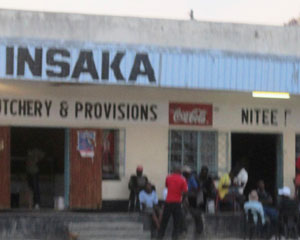
TONGOGARA Growth Point in Shurugwi, Midlands province, is one of the several rural service centres accorded growth point status by the government shortly after independence.
BY MOSES MUGUGUNYEKI
With the new status, villagers expected a boom in business and a better life, but that has not been the case. Instead, they are crumbling.
It is unlike other growth points — Mupandawana in Gutu, Murambinda in Buhera, Mutora (Nembudziya) in Gokwe North, Murewa, Jerera in Zaka, Mutoko and Gokwe — that are now fully-fledged business centres with banking services and large supermarkets.
Gokwe and Murewa have since been elevated to towns, thanks to their booming agricultural sector.
Named after the late Zanla commander, Josiah Magama Tongogara, Tongogara Growth Point is slowly turning into a ghost settlement.
For the past three decades, no meaningful development has taken place at the centre, save for a high school, clinic and Grain Marketing Board depot which receives sporadic supplies of grain and agricultural inputs.
In 1985, through the Public Sector Investment Programme (PSIP), each growth point received a minimum of Z$160 000 for infrastructural development, which saw the establishment of bus termini and market stalls, as well as rural council offices and cottages for council workers.
- Chamisa under fire over US$120K donation
- Mavhunga puts DeMbare into Chibuku quarterfinals
- Pension funds bet on Cabora Bassa oilfields
- Councils defy govt fire tender directive
Keep Reading
Villagers in this mineral-rich part of rural Shurugwi who spoke to Standardcommunity recently, said they felt the government has neglected them, at a time when they needed public infrastructure investments the most.
They called on government to fund small-to-medium enterprises, as well as other infrastructural developments at the growth point.
“The idea of transforming rural service centres into growth points was noble, but the government neglected these centres. Tongogara is one of the many dying rural service centres that failed to develop after many years of neglect,” said Stanley Ruvingo, a villager.
He expressed deep concern over the significant reduction of funds available for rural development, particularly growth points, saying this had relegated the idea of curbing rural-urban migration into oblivion.
When Standardcommunity visited the growth point recently, it looked deserted, like there had been no development occurring for quite some time.
There is no supermarket at the centre and villagers are compelled to buy groceries from a handful of small shops and kiosks. Beer outlets are the only notably busy spots, frequented by a few imbibers.
The clientele at the bars consists mainly of teachers from the nearby Tongogara High School, police officers, council workers and a handful of villagers who would have come to watch soccer from a DStv subscribed television.
“There is nothing to write home about here. During the early days this centre was a hub of activity. There was a bus garage belonging to Marongwe which used to employ a number of youths from this area. More than 10 buses used to pass through this centre on a daily basis, which boosted business for vendors and shop owners but today we have two buses left on the route. Bus companies say they can’t service the routes in our area because the roads are deplorable,” said another villager, Taurai Mawere. “We used to have a bakery but it has since ceased operations, while the council bar failed to compete with the three other beer outlets and closed its doors.”
Government initiated the growth point policy in 1981 in an effort to redress the unbalanced nature of the colonial economy.
The growth of rural service centres was seen as shifting investment concentration from urban areas, as well as reducing rural-urban migration.
Political and economic analyst, Vince Musewe said the idea of the growth point policy was good but the government set on its laurels while most growth points were crumbling.
“It was an excellent idea that helped spread economic development and income, while ensuring that those in the rural sector participated in the formal economy.
“However, there was no follow up and no real grand plan to develop growth points. You must also realise that agriculture played a huge role in ensuring the viability of growth points. Without a vibrant agricultural sector, employment decreased, so did the disposable income of those that reside in these areas,” said Musewe.
The major boon for Tongogara Growth Point is the construction of the Tongogara-Donga road which is being funded by the Tongogara Community Share Ownership Scheme. It is envisaged that the upgrading of the road will trigger development at the centre.
DONGA CENTRE RECORDS PHENOMENAL GROWTH
Tongogara now plays second fiddle to Donga Business Centre, which is popularly known as Chachacha. The centre has recorded a phenomenal growth over the years, compelling Tongogara Rural District Council to shift its attention to the business centre.
The council chief executive, Addington Munyoro said the council had no particular plan for Tongogara Growth Point but had a number of developmental projects for the whole district.
“One of our major projects is the rehabilitation of the water reticulation system at Donga Business Centre and close to 300 residential stands will benefit from the exercise,” said Munyoro. “We got assistance from the government and the Tongogara Community Share Ownership Trust.”











